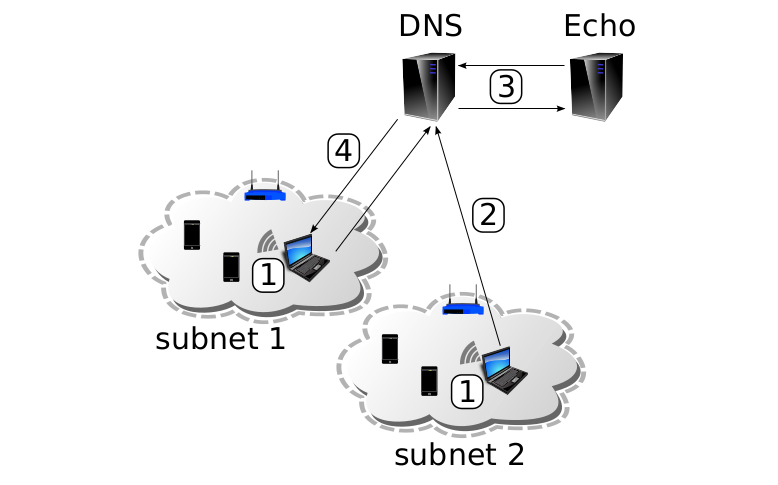Abstract
Several network applications, like service discovery, file discovery in P2P networks, distributed hash tables, and distributed caches, use or would benefit from distributed key value stores. The Domain Name System (DNS) is a key value store which has a huge infrastructure and is accessible from almost everywhere.
Nevertheless storing information in this database makes it necessary to be authoritative for a domain or to be “registered” with a domain, e.g. via DynDNS, to be allowed to store and update resource records using
nsupdate. Applications like the ones listed above would greatly benefit from a configurationless approach, giving users a much more convenient experience.
In this report we describe a technique we call Stateless DNS, which allows to store data in the cache of the local DNS server. It works without any infrastructure updates; it just needs our very simple, configurationless echo DNS server that can parse special queries containing information desired to be stored, process this information, and generate DNS answers in a way that the DNS cache that was asked the special query will store the desired information. Because all this happens in the authority zone of our echo DNS server, we do not cause cache poisoning. Our tests show that Stateless DNS works with a huge number of public DNS servers.
BibTeX (Download)
@techreport{Kaiser2014Stateless,
title = {Stateless DNS},
author = {Daniel Kaiser and Matthias Fratz and Marcel Waldvogel and Valentin Dietrich and Holger Strittmatter},
url = {https://netfuture.ch/wp-content/uploads/2015/02/kaiser14stateless.pdf},
year = {2014},
date = {2014-12-31},
urldate = {1000-01-01},
number = {KN-2014-DISY-004},
institution = {University of Konstanz},
abstract = {Several network applications, like service discovery, file discovery in P2P networks, distributed hash tables, and distributed caches, use or would benefit from distributed key value stores. The Domain Name System (DNS) is a key value store which has a huge infrastructure and is accessible from almost everywhere.
Nevertheless storing information in this database makes it necessary to be authoritative for a domain or to be “registered” with a domain, e.g. via DynDNS, to be allowed to store and update resource records using
nsupdate. Applications like the ones listed above would greatly benefit from a configurationless approach, giving users a much more convenient experience.
In this report we describe a technique we call Stateless DNS, which allows to store data in the cache of the local DNS server. It works without any infrastructure updates; it just needs our very simple, configurationless echo DNS server that can parse special queries containing information desired to be stored, process this information, and generate DNS answers in a way that the DNS cache that was asked the special query will store the desired information. Because all this happens in the authority zone of our echo DNS server, we do not cause cache poisoning. Our tests show that Stateless DNS works with a huge number of public DNS servers.},
type = {Technical Report},
keywords = {DNS-SD, Multicast, Peer-to-Peer, Privacy, Zeroconf},
pubstate = {published},
tppubtype = {techreport}
}




